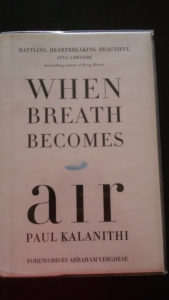
“You that seek what life is in death,
Now find it air that once was breath…”
The book opens with the poem ‘Caelica 83’ by Baron Fulke Greville and these two lines remained with me throughout the book.
This is a book that speaks about life and about death and especially about that grey area in between — of sickness — that everyone must navigate their way through at some point in time or the other – whether as patients, doctors, family, caregivers, or friends – to emerge on either one side or the other.
It is also a book that illuminates the doctor-patient relationship in its purest form, shorn of all the different connotations and implications that modern living, technology, corporatization, and so on have attached to it. It is, at its most fundamental level, a relationship of trust, compassion and faith between two imperfect humans. At times, the doctor can seem all-powerful, interceding with fate on behalf of his patient, and bringing him back to life and health. At other times, the doctor and patient are “no more, and no less, than two people huddled together, as one faces the abyss.”
A heart-wrenchingly honest book by a young doctor who became a patient and ultimately lost his life to cancer, it does not in any way attempt to gloss over raw human emotions. There is the palpable disappointment, the feeling of cosmic injustice that after a decade of backbreaking hard work and commitment, training to be a neurosurgeon, when he is within reach of the dreams and goals he has set for his life, he should find himself terminally ill, a patient, on the opposite side of the doctor-patient equation than the one he had envisioned.
“My life had been building potential, potential that would now go unrealized. I had planned to do so much, and I had come so close.”
“Death, so familiar to me in my work, was now paying a personal visit. Here we are, finally face-to-face, and yet nothing about it seems recognizable.”
There is confusion, and also acceptance: “Before my cancer was diagnosed, I knew that someday I would die, but I didn’t know when. After the diagnosis, I knew that someday I would die, but I didn’t know when. But, now I knew it acutely… The fact of death is unsettling. Yet, there is no other way to live.”
The epilogue, written by his wife Lucy after his death, is equally poignant and honest, and shows the immense power of humans to adapt, to even transcend their circumstances and to find the moments of pure joy that life sprinkles even amidst the harshest of tribulations. Their love for each other shines through the book.
“We each joked to close friends that the secret of saving a relationship is for one person to fall terminally ill. Conversely, we knew that one trick to managing a terminal illness is to be deeply in love…”
Paul “would, throughout his illness, work hard to secure my future. He was fiercely committed to ensuring the best for me, in our finances, my career, what motherhood would mean. At the same time, I worked hard to secure his present, to make his remaining time the best it could be…”
“At home in bed a few weeks before he died, I asked him ‘Can you breathe okay with my head on your chest like this?’ His answer was ‘It’s the only way I know how to breathe.’”
Finally, it is a book about life and about death, and about facing both with love, courage and integrity.